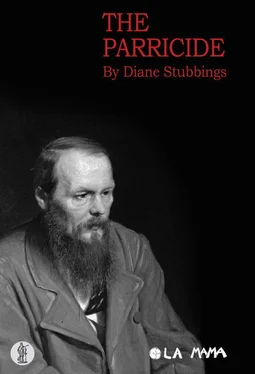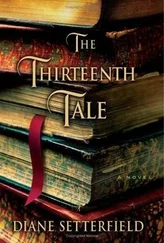FEDYA: There is no novel, there will be no novel—
ANNA: I’m the stenographer—
FEDYA slams the door shut.
[ Through the door ] I’m the stenographer!
A beat.
FEDYA opens the door again.
Nikolai Ivanovich sent me.
A beat.
FEDYA moves into the flat, leaving the door open. ANNA realises she’s expected to follow.
Inside, the room is still quite dark. FEDYA sits himself down and picks up his pen. His hand hovers over his notebook.
A silence.
[ Filling the silence ] That you weren’t here. That’s what I thought. At first. Or not answering. The number of times I knocked. I’d have gone. Given up. But Kolya— [ Correcting herself ] Nikolai Ivanovich—he said if you didn’t answer—
FEDYA gestures for her to be quiet.
Silence.
[ Again needing to fill the silence ] Your landlady, she said you were dangerous. That you wouldn’t be here. That you’re never here. She said to go home. But I could hear you talking and—
Another gesture to be quiet.
A beat.
FEDYA returns to the notebook. His hand hovering again, as though ready to write. After a moment, he gives it up. He goes about the room, opening shutters etc, letting in light.
FEDYA: A universe of ideas and what do I have to show for it? Half a page of nonsense. Sentences barely breathing. Because you knock at my door.
ANNA: I could go—
FEDYA: Too late—
ANNA: Come back—
FEDYA: It’s dead now.
Your name again?
ANNA: Anna Grigorevna.
FEDYA: I had a dream last night, Anna Grigorevna. A flea biting at me as I slept. I pulled my mattress apart searching for it, but it wouldn’t be found. So on it went. Biting and biting. Was that you, do you think?
ANNA: A dream is a dream.
FEDYA: Is that meant to be a clever answer?
ANNA: No.
FEDYA: You’re looking at my eye.
ANNA: No.
FEDYA: You are.
ANNA: I’m not.
FEDYA: You think it odd.
ANNA: No.
FEDYA: Why not? It is odd.
A fit. Last night. I fell. Knocked my eye. See? It seems I have no iris at all.
He is very close to her.
FEDYA: Kolya’s told you you’d be working for an ex-convict?
ANNA: Your sentence is finished, sir.
FEDYA: But you’re never entirely free.
Do you know why I was imprisoned?
ANNA: Yes.
FEDYA: I’m not a murderer, no matter what my landlady thinks.
ANNA: No.
FEDYA: I spoke my mind.
Nothing for you to fear.
A beat.
There must be a scrap of some abandoned novel here somewhere. Something worthless enough for Stellovsky…
FEDYA begins searching among his papers. Realising he’s not going to clear a space for her, ANNA finds herself somewhere to sit, takes her notepad etc from her case.
FEDYA has gathered together what seem like scraps of paper—bits of this and that, of various sizes. He has a handful of them. He starts organising them into some sort of order, finds the one that he’ll begin with. The whole business is quite involved and time-consuming.
He seems about to begin. Hesitates.
[ Conversationally ] Do you want tea?
ANNA: No.
FEDYA: Brandy?
ANNA: No.
FEDYA: The landlady used to bring me tea. When she knew I was here. Every other hour, a whole new pot. Even soup sometimes. Cake if she was feeling particularly generous. Until the incident with the rock. She thought I was going to kill her. I wasn’t. I was just working, but—. She hasn’t brought me so much as a mouthful of tea since. ‘If it’s in your head. If it’s in your head to do it,’ she says, ‘then who’s to say that your hands won’t one day follow?’
A beat.
FEDYA: You know my writing?
ANNA: A little.
FEDYA: Crime and Punishment. My last novel. You must know it.
ANNA: The work, sir.
FEDYA: Just say. If you haven’t read it.
I don’t bite.
ANNA: I haven’t read it.
FEDYA: There. Not so difficult.
Why haven’t you read it?
ANNA: I—I’ve not had the time.
FEDYA: Why, what have you been doing?
ANNA: Studying.
FEDYA: You’re a student?
ANNA: I was.
FEDYA: Of what?
ANNA: Stenography.
FEDYA: Yes. A student. Of stenography.
Where did you study?
ANNA: Where did I study?
FEDYA: Where did you study?
ANNA: Does it matter?
FEDYA: Some institutions have better reputations than others.
ANNA: For stenography?
FEDYA: For unrest.
ANNA: You’re asking if I’m a revolutionary?
FEDYA: Are you?
ANNA: Not all students are revolutionaries.
FEDYA: Are you?
ANNA: No.
FEDYA: There weren’t mumblings of sedition amongst your fellow students?
ANNA: You think there’s a cabal of stenographers plotting to overthrow the Tsar?
FEDYA: What do I know of stenographers and their persuasions?
ANNA: Is there to be any work/ at all this morning—?
FEDYA: Why didn’t you have the time? To read my book.
ANNA: I told you. I was studying.
FEDYA: The rest of Petersburg seems to have had the time.
Is stenography so arduous a course—?
ANNA: I was caring for my dying father.
I was caring for my father.
A long beat.
FEDYA: Have you been asked to reveal what I’m writing?
ANNA: By whom?
FEDYA: By anyone. By Kolya.
ANNA: No.
FEDYA: What notes I make?
ANNA: No.
FEDYA: Where I go? Who I see?
ANNA: Do you need watching?
FEDYA: There are people who seem to think so. You’d be surprised the sort of people hired to do the watching.
What’s your relationship with Kolya?
ANNA: My relationship?
FEDYA: Why did he send you?
ANNA: He said I’d be helping a famous novelist—
FEDYA: That’s what he told you to tell me?
ANNA: I had hoped it might be Tolstoy.
FEDYA: Have you read any of my work?
ANNA: Some.
FEDYA: And?
And?
ANNA: It was a little too sentimental for my taste.
A beat.
FEDYA: You can go.
It won’t work.
There’s. No. Job.
KOLYA ’s office. ANNA puts money on the table.
ANNA: He said there’s no job. No novel.
KOLYA: No novel?
ANNA: That’s what he said.
KOLYA: How was he? How did he seem?
ANNA: How did he seem?
KOLYA: Anxious? Troubled?
ANNA: Rude. Hateful.
Old.
KOLYA: You need to go back.
ANNA: He doesn’t seem to like you very much.
KOLYA: I know.
ANNA: You said you were friends.
KOLYA: We’re Russian friends. Bound together by a mutual hatred.
Give me one day. Then try him again.
One day.
[ Pushing the money back towards her ] For your trouble so far.
She leaves without taking the money.
The actor playing ANNA transitions into KATYA . As she does—
[ANNA]: I’d read Crime and Punishment —of course I’d read it. I’d read every book he’d ever written. But if he thought I was going to give him the satisfaction…
I’d read it each day as I walked to and from the institute. And then, at night, I’d read it again to my father. It was a heavy presence all through Petersburg, that book—and my father wouldn’t be denied it.
Late at night, as he waited for sleep, my father would tell me the dark story of Dostoyevsky’s arrest. His imprisonment. And the tears would well in my father’s eyes. This, he said—this is how Russia treats her saviours. And it broke my heart to hear it.
Читать дальше












